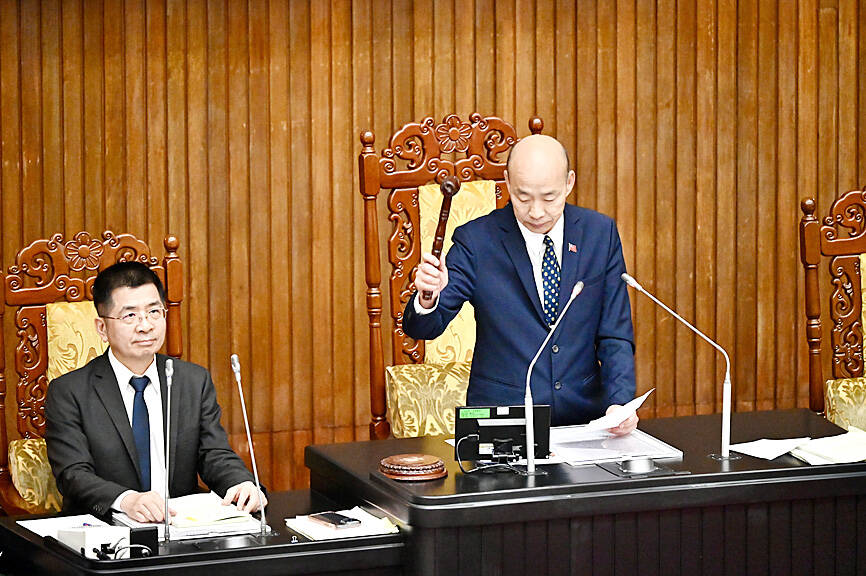The legislature’s passage last week of amendments to the Act for Industrial Innovation (產業創新條例) would help retain crucial technologies at home and promote the adoption of artificial intelligence (AI) and carbon-reduction technologies, the Ministry of Economic Affairs (MOEA) said on Friday.
Under the amendment to the act’s Article 22, companies investing in certain countries, industries or technologies are required to obtain government approval if their investments are above a designated threshold, have a potentially negative impact on national security or economic development, obstruct the government’s ability to abide by international protocols, or contravene labor laws.
Article 22 had previously only required companies making overseas investments of more than NT$1.5 billion (US$45.99 million) to obtain prior approval from the authorities, the ministry said.

Photo: George Tsorng, Taipei Times
Under the new Article 67-3, companies failing to gain prior government approval for investing in designated countries face fines ranging from NT$50,000 to NT$1 million, with repeated contraventions subject to higher fines of between NT$500,000 and NT$10 million, the ministry said.
Previously, the regulation only applied to companies’ investment amount, with investments above the NT$1.5 billion threshold requiring prior approval and those below subject to post-review. The revised rule stipulates that investments in some designated regions and industries also need to gain prior regulatory permission, Department of Investment Reviews Deputy Director-General Su Chi-yen (蘇琪彥) said.
Under the amended Article 10-1, investments in AI and energy-saving projects are eligible for tax deductions, alongside existing categories such as smart machinery, 5G systems and cybersecurity applications, the Industrial Development Administration (IDA) said.
The maximum tax deduction rate for such investments is 5 percent, as the law aims to encourage companies to adopt digital tools such as AI and cloud computing to enhance operational agility and reduce carbon emissions, it added.
In addition, the cap on eligible investments is to be raised from NT$1 billion to NT$2 billion, which means that companies previously only eligible for a maximum tax deduction of NT$50 million could now apply for a deduction of up to NT$100 million, with the incentive remaining effective until the end of 2029, IDA Deputy Director-General Chen Pei-li (陳佩利) said.
To support domestic start-ups, newly amended Article 23-1 lowers the minimum paid-in capital requirement for limited partnership venture capital firms to NT$150 million from NT$300 million, while major shareholders are required to increase their investments in the start-ups from the third year onward to ensure access to funding during the early establishment stage, Chen said.
“We made this decision following the concept of pass-through tax, which is levied only on shareholders rather than on companies, to help ease financial pressure on start-ups,” she added.
Investing in companies designated as national strategic industries are to benefit from a maximum personal income tax deduction of NT$5 million, up from NT$3 million previously, as part of the ministry’s plan to support start-ups, Chen said.

In Italy’s storied gold-making hubs, jewelers are reworking their designs to trim gold content as they race to blunt the effect of record prices and appeal to shoppers watching their budgets. Gold prices hit a record high on Thursday, surging near US$5,600 an ounce, more than double a year ago as geopolitical concerns and jitters over trade pushed investors toward the safe-haven asset. The rally is putting undue pressure on small artisans as they face mounting demands from customers, including international brands, to produce cheaper items, from signature pieces to wedding rings, according to interviews with four independent jewelers in Italy’s main

Japanese Prime Minister Sanae Takaichi has talked up the benefits of a weaker yen in a campaign speech, adopting a tone at odds with her finance ministry, which has refused to rule out any options to counter excessive foreign exchange volatility. Takaichi later softened her stance, saying she did not have a preference for the yen’s direction. “People say the weak yen is bad right now, but for export industries, it’s a major opportunity,” Takaichi said on Saturday at a rally for Liberal Democratic Party candidate Daishiro Yamagiwa in Kanagawa Prefecture ahead of a snap election on Sunday. “Whether it’s selling food or

CONCERNS: Tech companies investing in AI businesses that purchase their products have raised questions among investors that they are artificially propping up demand Nvidia Corp chief executive officer Jensen Huang (黃仁勳) on Saturday said that the company would be participating in OpenAI’s latest funding round, describing it as potentially “the largest investment we’ve ever made.” “We will invest a great deal of money,” Huang told reporters while visiting Taipei. “I believe in OpenAI. The work that they do is incredible. They’re one of the most consequential companies of our time.” Huang did not say exactly how much Nvidia might contribute, but described the investment as “huge.” “Let Sam announce how much he’s going to raise — it’s for him to decide,” Huang said, referring to OpenAI

The global server market is expected to grow 12.8 percent annually this year, with artificial intelligence (AI) servers projected to account for 16.5 percent, driven by continued investment in AI infrastructure by major cloud service providers (CSPs), market researcher TrendForce Corp (集邦科技) said yesterday. Global AI server shipments this year are expected to increase 28 percent year-on-year to more than 2.7 million units, driven by sustained demand from CSPs and government sovereign cloud projects, TrendForce analyst Frank Kung (龔明德) told the Taipei Times. Demand for GPU-based AI servers, including Nvidia Corp’s GB and Vera Rubin rack systems, is expected to remain high,